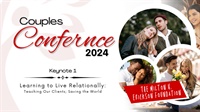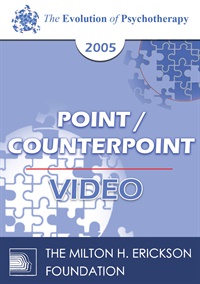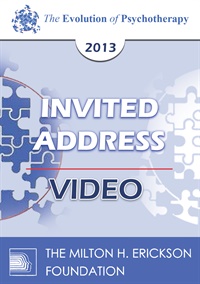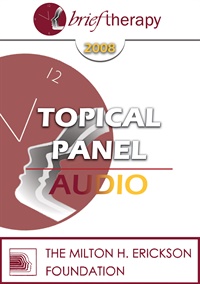
- Average Rating:
- Not yet rated
- Topic Areas:
- Topical Panels | Positive Psychology | Social Issues
- Categories:
- Brief Therapy Conference | Brief Therapy Conference 2008
- Faculty:
- Mary Goulding, MSW | Kenneth Hardy, PhD | Jeffrey Kottler, PhD | Michael Yapko, PhD
- Duration:
- 59:03
- Format:
- Audio Only
- Original Program Date:
- Dec 13, 2008
- Short Description:
- This session explores the intersection of therapy and social issues, examining how psychotherapy contributes to shifting moral perspectives, cultural engagement, and public health. Panelists highlight themes such as moral relativity versus absolutism, the therapist’s role in addressing systemic injustices, and the risks of reducing depression to biology alone. Participants gain a broader understanding of how therapy influences social change and how therapists can bring their skills to communities, families, and cultural contexts beyond individual treatment.
- Price:
- $15.00 - Base Price
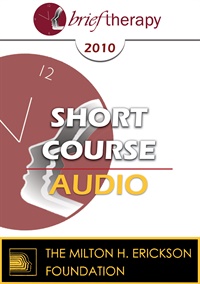
- Average Rating:
- Not yet rated
- Topic Areas:
- Short Courses | Brief Therapy | Multicultural | Social Issues
- Categories:
- Brief Therapy Conference | Brief Therapy Conference 2010
- Faculty:
- Naji Abi-Hashem, PhD
- Duration:
- 1:52:01
- Format:
- Audio Only
- Original Program Date:
- Dec 09, 2010
- Short Description:
- This wide ranging seminar looks at how globalization, secularism and rising fundamentalism shape the lives of clients and caregivers. The presenter explores identity, culture shock and the psychological fatigue created by rapid change, then offers ways to understand rigidity, polarization and radicalization without reducing them to pathology. Participants learn how to work more sensitively and flexibly across cultures, strengthen their own “cultural self” and support clients navigating loss, dislocation and shifting worldviews.
- Price:
- $15.00 - Base Price
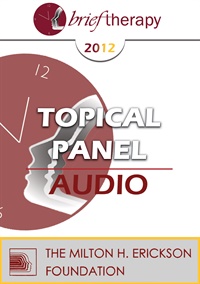
- Average Rating:
- Not yet rated
- Topic Areas:
- Topical Panels | Social Issues | Therapy Practice
- Categories:
- Brief Therapy Conference | Brief Therapy Conference 2012
- Faculty:
- Esther Perel, MA, LMFT | Michael Yapko, PhD | Jeffrey Kottler, PhD | Casey Truffo, M.S.,M.F.T.
- Duration:
- 59:07
- Format:
- Audio Only
- Original Program Date:
- Dec 07, 2012
- Short Description:
- This session explores the intersection of therapy and social issues, addressing how depression, human trafficking, cultural transition, sexuality, and technology affect clients and communities. Panelists emphasize that psychotherapy cannot remain isolated from broader social forces, urging practitioners to consider activism, financial sustainability, and community connection as integral to their work. Participants gain a wide-angle view of therapy’s role in addressing the ethical, cultural, and economic challenges of contemporary life.
- Price:
- $15.00 - Base Price
- Average Rating:
- Not yet rated
- Topic Areas:
- Keynotes | Couples Therapy | Relational Life Therapy Model (RLT) | Social Issues
- Bundle(s):
- 2024 Couples Conference Bundle
- Categories:
- Couples Conference | Couples Conference 2024 | Pioneers in Couples and Family Therapy
- Faculty:
- Terry Real, LICSW
- Course Levels:
- Master Degree or Higher in Health-Related Field
- Duration:
- 1:02:49
- Format:
- Audio and Video
- Original Program Date:
- May 03, 2024
- Short Description:
- This talk examines the global rise of patriarchy and its impact on intimate relationships, highlighting how anti-relational culture contributes to high failure rates in long-term partnerships. The speaker presents Relational Life Therapy (RLT) as a solution, built on three phases: loving confrontation, trauma work, and skill-building. Emphasizing the need to teach relational skills in schools, the approach addresses both individual challenges—like grandiosity and shame—and broader systemic influences to build healthier, more connected relationships.
- Price:
- $59.00 - Base Price
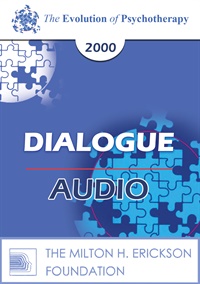
- Average Rating:
- Not yet rated
- Topic Areas:
- Dialogues | Social Issues | Violence Prevention
- Categories:
- Evolution of Psychotherapy | Evolution of Psychotherapy 2000 | Pioneers in Couples and Family Therapy
- Faculty:
- Alexander Lowen, MD | Cloe Madanes, HDL, LIC
- Duration:
- 57 Minutes
- Format:
- Audio Only
- Original Program Date:
- May 27, 2000
- Short Description:
- This dialogue addresses the roots of social violence and effective strategies for prevention. Topics include the psychological effects of cultural restriction and overstimulation, the role of empathy, and the impact of spiritual pain. A successful model for reducing juvenile re-offense rates is shared, emphasizing reparation, emotional healing, and the need for broader societal change. Moderated by Christine Padesky.
- Price:
- $15.00 - Base Price
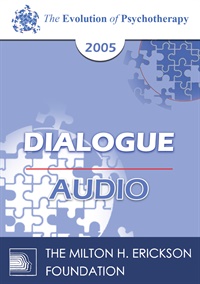
- Average Rating:
- Not yet rated
- Topic Areas:
- Dialogues | Social Issues | Psychotherapy
- Categories:
- Evolution of Psychotherapy | Evolution of Psychotherapy 2005
- Faculty:
- Mary Goulding, MSW | James Hillman, PhD
- Duration:
- 58 Minutes
- Format:
- Audio Only
- Original Program Date:
- Dec 09, 2005
- Short Description:
- Dialogue 02 from the Evolution of Psychotherapy 2005 - Politics and Therapy Featuring Mary Goudling, MSW, and James Hillman, PhD Moderated by Jon Carlson, PsyD, EdD
- Price:
- $15.00 - Base Price
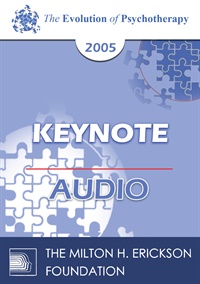
- Average Rating:
- Not yet rated
- Topic Areas:
- Keynotes | Special Topics | Love | Social Issues | Trauma
- Categories:
- Evolution of Psychotherapy | Evolution of Psychotherapy 2005
- Faculty:
- Hunter "Patch" Adams, MD
- Duration:
- 1 Hour
- Format:
- Audio Only
- Original Program Date:
- Dec 07, 2005
- Short Description:
- This unforgettable keynote blends performance, activism and raw humanity as Patch Adams calls for a global shift from power and greed toward compassion, justice and communal care. Moving between poetry, personal stories, global witness and clowning, he illustrates how love, presence and joyful service can interrupt violence, heal despair and restore our capacity to act. Participants are invited into a stirring reflection on what it means to live bravely, serve wholeheartedly and redesign a world rooted in human dignity.
- Price:
- $15.00 - Base Price
- Average Rating:
- Not yet rated
- Topic Areas:
- Keynotes | Consciousness | Psychotherapy | Social Issues
- Categories:
- Evolution of Psychotherapy | Evolution of Psychotherapy 2005
- Faculty:
- Mary Catherine Bateson, PhD
- Course Levels:
- Master Degree or Higher in Health-Related Field
- Duration:
- 1:14:10
- Format:
- Audio and Video
- Original Program Date:
- Dec 08, 2005
- Short Description:
- An exploration of how psychotherapy can support people as they adapt to rapid cultural, social, and environmental change. Drawing on anthropology, developmental theory, and lived experience, the session invites participants to rethink distress not only as individual pathology, but as a response to shifting roles, values, and life stages. The talk challenges therapists to see their work as supporting lifelong growth, reflection, and meaning-making, especially as clients navigate aging, identity, and responsibility in an increasingly complex world.
- Price:
-
Sale is $29.00
price reduced from Base Price - $59.00

- Average Rating:
- Not yet rated
- Topic Areas:
- Point/Counterpoint Sessions | Family Therapy | Social Issues | Managed Care
- Categories:
- Evolution of Psychotherapy | Evolution of Psychotherapy 2005 | Pioneers in Couples and Family Therapy
- Faculty:
- Cloe Madanes, HDL, LIC | Thomas Szasz, MD
- Duration:
- 1 Hour 19 Minutes
- Format:
- Audio Only
- Original Program Date:
- Dec 07, 2005
- Short Description:
- Cloe Madanes highlights the value of prioritizing relationships over individual pathology in family therapy. She critiques the influence of Big Pharma and managed care, warning against overmedication and noting that antidepressants show only a 10% improvement over placebos. Case examples include a suicidal man who regained joy and a young woman with epilepsy who improved through family therapy. Dr. Thomas Szasz adds a libertarian perspective, arguing that mental illness can become a self-fulfilling prophecy shaped by economic and political forces. Moderated by Bernhard Trenkle, Dipl. Psych.
- Price:
- $15.00 - Base Price
- Average Rating:
- Not yet rated
- Topic Areas:
- Point/Counterpoint Sessions | Multicultural | Community | Psychotherapy | Social Issues
- Categories:
- Evolution of Psychotherapy | Evolution of Psychotherapy 2005
- Faculty:
- Jean Houston, PhD | Mary Catherine Bateson, PhD
- Course Levels:
- Master Degree or Higher in Health-Related Field
- Duration:
- 1:19:00
- Format:
- Audio and Video
- Original Program Date:
- Dec 08, 2005
- Short Description:
- This session explores the idea of the therapist as a social artist, someone whose work extends beyond the consulting room into culture, community, and leadership. The faculty examines how therapeutic skills like deep listening, imagination, metaphor, and improvisation can support social healing, ethical action, and collective change in times of global stress. Participants are invited to rethink psychotherapy as both a personal and cultural practice, one that helps individuals and communities adapt, create meaning, and participate more consciously in shaping the world they live in.
- Price:
-
Sale is $29.00
price reduced from Base Price - $59.00
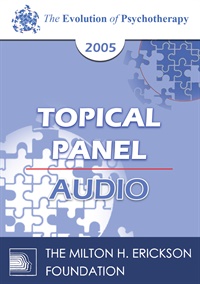
- Average Rating:
- Not yet rated
- Topic Areas:
- Topical Panels | Psychotherapy | Therapist Development | Community | Social Issues
- Categories:
- Evolution of Psychotherapy | Evolution of Psychotherapy 2005 | Pioneers in Couples and Family Therapy
- Faculty:
- Mary Goulding, MSW | James F. Masterson, MD | Cloe Madanes, HDL, LIC | Jean Houston, PhD
- Duration:
- 1 Hour
- Format:
- Audio Only
- Original Program Date:
- Dec 09, 2005
- Short Description:
- This discussion examines therapist perspectives on therapeutic neutrality and social commitment. Mary Goulding highlights community resilience, while James Masterson supports neutrality with social awareness. Cloe Madanes advocates for directive therapy to protect the vulnerable, and Jean Houston calls for integrating personal and societal healing. The panel agrees that therapists must address social issues without compromising clinical integrity, acting as both healers and agents of change. Moderated by Jon Carlson, PsyD, EdD
- Price:
- $15.00 - Base Price
- Average Rating:
- Not yet rated
- Topic Areas:
- Invited Addresses | Social Issues | Psychotherapy | Trauma
- Categories:
- Evolution of Psychotherapy | Evolution of Psychotherapy 2013
- Faculty:
- Mary Pipher, PhD
- Course Levels:
- Master Degree or Higher in Health-Related Field
- Duration:
- 1:06:21
- Format:
- Audio and Video
- Original Program Date:
- Dec 14, 2013
- Short Description:
- We’ll explore the deluge tidal of information, including a great deal of traumatic information about the fate of Mother Earth, that all of us are confronted with daily. I’ll share the steps of a trauma-to-transcendence cycle that begins with awareness, leads to resilient coping, and then continues to a transcendent response. This cycle always involves action and creates hope.
- Price:
-
Sale is $29.00
price reduced from Base Price - $59.00
Tags: Trauma Social Issues Psychotherapy
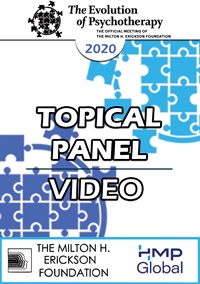
- Average Rating:
- Not yet rated
- Topic Areas:
- Multicultural | Topical Panels | Professional Practice | Social Issues
- Categories:
- Evolution of Psychotherapy | Evolution of Psychotherapy 2020
- Faculty:
- Patricia Arredondo, EdD | Robert Dilts, BA | Derald Wing Sue, PhD
- Course Levels:
- Master Degree or Higher in Health-Related Field
- Duration:
- 1 hour
- Format:
- Audio and Video
- Original Program Date:
- Dec 13, 2020
- Short Description:
- This panel brings together leaders in multicultural psychology to examine how race, power, and identity shape mental health practice at both clinical and systemic levels. The conversation moves from lived experience to practical action, addressing microaggressions, racial battle fatigue, burnout, and the limits of traditional cultural competency models. Therapists and administrators are invited to think more critically about bias, emotional intelligence, and institutional change, with clear relevance for everyday clinical work and organizational leadership.
- Price:
-
Sale is $29.00
price reduced from Base Price - $59.00
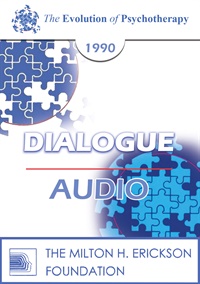
- Average Rating:
- Not yet rated
- Topic Areas:
- Dialogues | Social Issues | Psychotherapy
- Categories:
- Evolution of Psychotherapy | Evolution of Psychotherapy 1990
- Faculty:
- James Hillman, PhD | Thomas Szasz, MD
- Duration:
- 59 Minutes
- Format:
- Audio Only
- Original Program Date:
- Dec 14, 1990
- Short Description:
- Dialogue 06 from the Evolution of Psychotherapy 1990 - The Politics of Psychotherapy: Negative Effects and Intended Outcomes, featuring James Hillman, PhD, and Thomas Szasz, MD. Moderated by W Michael Munion, MA
- Price:
- $15.00 - Base Price
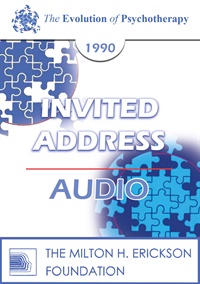
- Average Rating:
- Not yet rated
- Topic Areas:
- Invited Addresses | Addiction | Community | Social Issues | Psychotherapy
- Categories:
- Evolution of Psychotherapy | Evolution of Psychotherapy 1990
- Faculty:
- Thomas Szasz, MD | Rollo May, PhD
- Duration:
- 1 Hour 20 Minutes
- Format:
- Audio Only
- Original Program Date:
- Dec 15, 1990
- Short Description:
- Dr. Szasz will present a brief historical review of drug controls in the United States; a critical analysis of the transformation of the trade in drugs from a free market at the beginning of the century to a tightly statist system of controls today; and a market-oriented analysis of the "drug problem."
- Price:
- $15.00 - Base Price
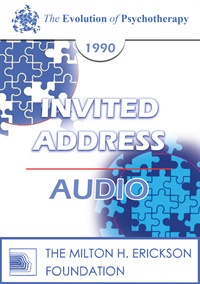
- Average Rating:
- Not yet rated
- Topic Areas:
- Invited Addresses | Femininity | Gender | Psychotherapy | Belief Systems | Social Issues
- Categories:
- Evolution of Psychotherapy | Evolution of Psychotherapy 1990
- Faculty:
- Miriam Polster | James Bugental, PhD
- Duration:
- 1 Hour 20 Minutes
- Format:
- Audio Only
- Original Program Date:
- Dec 15, 1990
- Short Description:
- Heroism has long been cast in a single mold, bold, solitary, and triumphantly masculine. In this thoughtful invited address, the speaker reclaims heroism as a fully human capacity, drawing on myth, psychology, and contemporary life to explore how connection, responsibility, and moral courage have shaped women’s often unrecognized forms of bravery. Moving from Prometheus and Eve to everyday acts of dignity and resistance, the talk invites therapists to recognize “ordinary” courage in their clients and to help redefine heroism as something lived in kitchens, classrooms, courtrooms, and consulting rooms alike. Commentary by James Bugental, PhD
- Price:
- $15.00 - Base Price
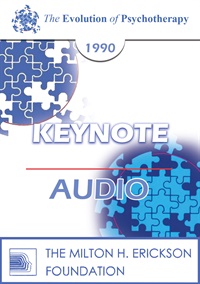
- Average Rating:
- Not yet rated
- Topic Areas:
- Keynotes | Community | Femininity | Gender | Masculinity | Social Issues | Psychotherapy
- Categories:
- Evolution of Psychotherapy | Evolution of Psychotherapy 1990
- Faculty:
- Betty Friedan
- Duration:
- 1 Hour 6 Minutes
- Format:
- Audio Only
- Original Program Date:
- Dec 16, 1990
- Short Description:
- The enormous changes brought about in the last 25 years by the women's movement and the sex role revolution have opened new possibilities and problems-sources of conflict and new strengths for women, men and families. There is a challenge now for psychotherapists to break through their own remnant stereotypes of feminine mystique, masculine mystique, and obsolete assumptions about family so that they may distinguish between personal and political pathology and help evolving women, men and families find and use more consciously their new strengths and confront real problems realistically.
- Price:
- $15.00 - Base Price
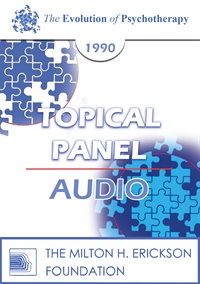
- Average Rating:
- Not yet rated
- Topic Areas:
- Topical Panels | Psychotherapy | Ethical Practice | Social Issues
- Categories:
- Evolution of Psychotherapy | Evolution of Psychotherapy 1990 | Pioneers in Couples and Family Therapy
- Faculty:
- Mary Goulding, MSW | Jay Haley, MA | Salvador Minuchin, MD | Thomas Szasz, MD
- Duration:
- 1 Hour 2 Minutes
- Format:
- Audio Only
- Original Program Date:
- Dec 15, 1990
- Short Description:
- This conversation explores the ethical tensions between therapy and social control, including court-ordered treatment, involuntary clients, and state-funded care. Panelists reflect on the therapist’s role in promoting autonomy while navigating systemic constraints. Topics include advocacy, community-based models, and the balance between support and coercion in institutional contexts. Moderated by Stephen Gilligan, PhD.
- Price:
- $15.00 - Base Price
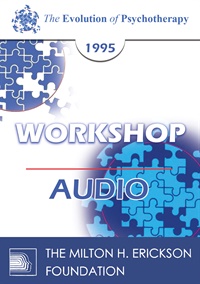
- Average Rating:
- Not yet rated
- Topic Areas:
- Workshops | Art and Creativity | Social Issues | Depression | Religion | Psychotherapy
- Categories:
- Evolution of Psychotherapy | Evolution of Psychotherapy 1995
- Faculty:
- James Hillman, PhD
- Duration:
- 2 Hours
- Format:
- Audio Only
- Original Program Date:
- Dec 14, 1995
- Short Description:
- This workshop is a phenomenology of melancholy. Jungian approaches to depression; clinical treatments, societal implications, resistances, suicidal risks and practical techniques will be demonstrated. The 50-minute, prizewinning BBC Documentary "Kind of Blue," narrated by the presenter will be featured.
- Price:
- $15.00 - Base Price
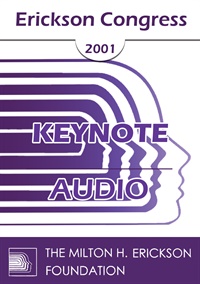
- Average Rating:
- Not yet rated
- Topic Areas:
- Keynotes | Psychotherapy | Social Issues | Humanistic Therapy | Systems Thinking
- Categories:
- Erickson Congress 2001 | Erickson Congress | Pioneers in Couples and Family Therapy
- Faculty:
- Cloe Madanes, HDL, LIC
- Duration:
- 1:01:26
- Format:
- Audio Only
- Original Program Date:
- Dec 08, 2001
- Short Description:
- Cloe Madanes shares her journey and insights, urging therapists to embrace their roles as humanist social activists. Drawing from her work in strategic and family therapy, she addresses issues like violence, sexual abuse, and institutionalization. She critiques the medicalization of therapy and the influence of managed care, advocating for ethical, human-centered practice rooted in social responsibility and emotional healing.
- Price:
- $15.00 - Base Price
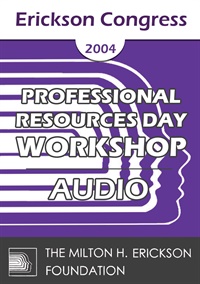
- Average Rating:
- Not yet rated
- Topic Areas:
- Workshops | Family Therapy | Social Issues | Psychopharmacology | Meditation, Spirituality and Yoga | Therapist Development | Ericksonian Hypnosis and Therapy Techniques
- Categories:
- Erickson Congress 2004 | Erickson Congress
- Faculty:
- Michele Ritterman
- Duration:
- 2:03:14
- Format:
- Audio Only
- Original Program Date:
- Dec 01, 2004
- Short Description:
- This workshop addresses everything from cruelty in families, to terrorism in politics and the abuse of psychopharmacology and managed care. It offers a higher order resolution method to all levels of human conflict and a model of human dignity.
- Price:
- $15.00 - Base Price

- Average Rating:
- Not yet rated
- Topic Areas:
- Short Courses | Ericksonian Hypnosis and Therapy Techniques | Hypnotherapy | Hypnosis | Social Issues
- Categories:
- Erickson Congress | Erickson Congress 2004
- Faculty:
- Halim Faisal, MSW | Diane Holliman, PhD
- Duration:
- 1:19:41
- Format:
- Audio Only
- Original Program Date:
- Dec 02, 2004
- Short Description:
- Hypnotherapy has been an under-used tool in social work. However, the principles of Ericksonian hypnotherapy are quite congruent with social work especially in serving at risk populations. Examples of how to use Ericksonian hypnotherapy and evaluate outcomes with at risk populations will be presented.
- Price:
- $15.00 - Base Price

- Average Rating:
- Not yet rated
- Topic Areas:
- Short Courses | Children and Adolescent Therapy | Ericksonian Hypnosis and Therapy Techniques | Abuse | Family Therapy | Social Issues
- Categories:
- Erickson Congress | Erickson Congress 2004
- Faculty:
- David Barnum | Wesley Crenshaw, PhD
- Duration:
- 1:19:45
- Format:
- Audio Only
- Original Program Date:
- Dec 02, 2004
- Short Description:
- Few cases are as difficult for therapists as those involving the intentional harm of one family member against another. This course provides participants the fundamentals of the model for treating family injustice developed by The Family Therapist Institute Midwest and presented in the new book, Treating Families and Children in the Child Protective System: Strategies for Systemic Advocacy and Family Healing. Didactic, participant discussion and videotape examples explain the model and its application.
- Price:
- $15.00 - Base Price
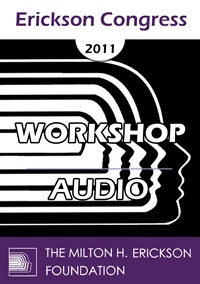
- Average Rating:
- Not yet rated
- Topic Areas:
- Psychotherapy | Workshops | Multicultural | Social Issues | Belief Systems
- Categories:
- Erickson Congress | Erickson Congress 2011
- Faculty:
- Naji Abi-Hashem, PhD
- Duration:
- 59 Minutes
- Format:
- Audio Only
- Original Program Date:
- Dec 07, 2011
- Short Description:
- This workshop examines how globalization, secularism and rising fundamentalism shape the lives of clients and caregivers in a rapidly shifting world. Through cultural analysis, personal stories and clinical reflection, the presenter explores identity, belonging, dislocation and the psychological fatigue created by constant change. Participants learn how to work sensitively across cultures, recognize their own biases, and support clients navigating polarization, loss of tradition and the search for stability and meaning.
- Price:
- $20.00 - Base Price


